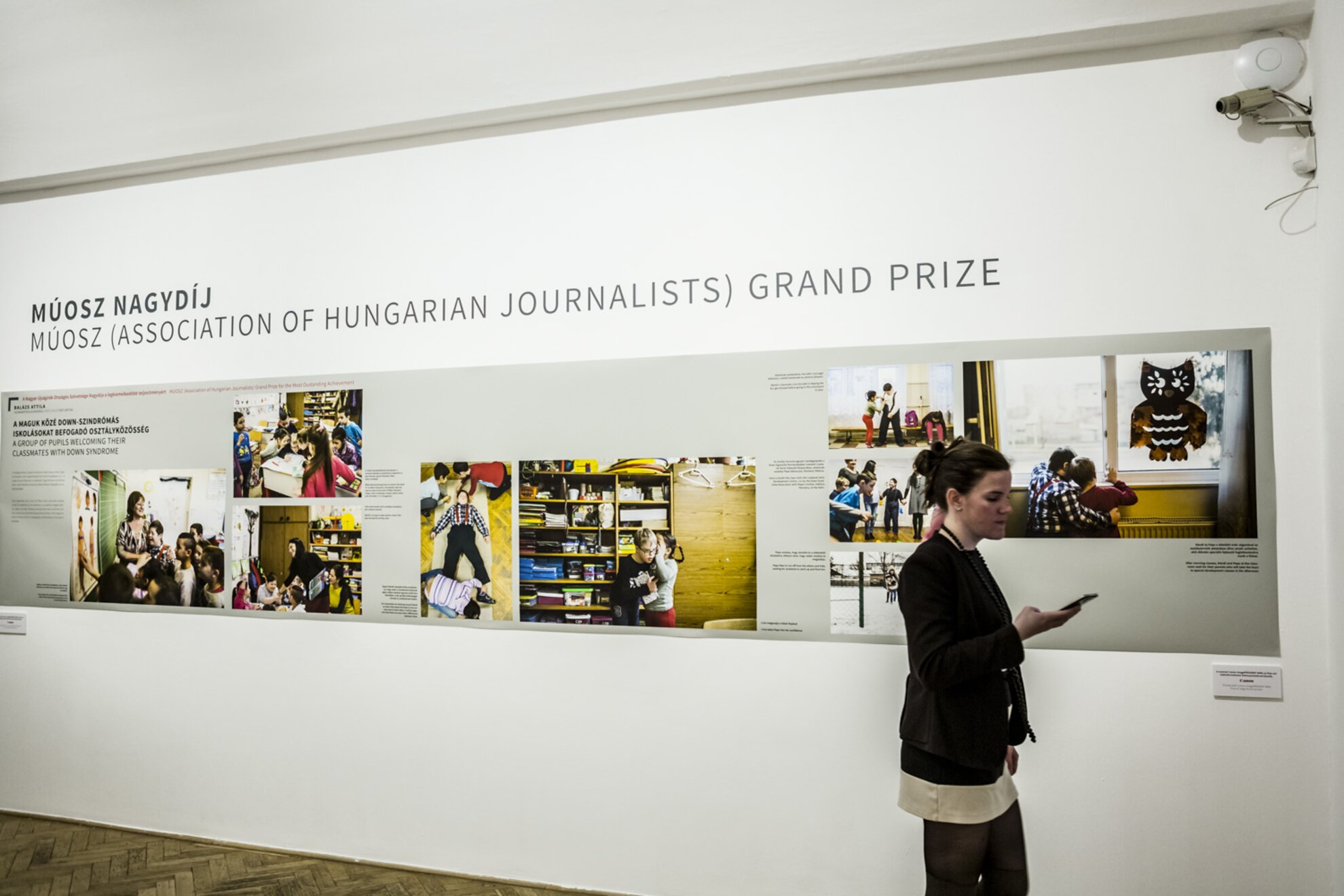At the World Press Photo Exhibition, the displayed photographs are usually intended to shock and upset their audience, but the smaller Hungarian version of this display follows a slightly different approach. We don’t have to expect idyllic and corny images, but the organizers emphasized that instead of traumatic, bloody themes, the exhibited material aims to show the beauty in relationships, humanity, and valor. The heartwarming series of Attila Balázs, for example, earned him the Grand Prize of the Association of Hungarian Journalists, showing the everyday life of a class community admitting boys with Down Syndrome. The André Kertész Grand Prize was awarded to the work of Máté Szekeres, depicting the story of a woman’s kidney transplant.

Naturally, we can’t ignore significant events such as the sudden, controversial closure of left-leaning newspaper Népszabadság, the contract-shredding of competitive swimmer Katinka Hosszú, or the ongoing refugee crisis; the photos of this latter issue portray the conditions of displaced people in Belgrade, Greece, and Macedonia. But there are plenty of images with social themes, like pictures depicting a family living without electricity, homeless shacks, and a blind mother of three. However, the social representation isn’t limited to the presentation of poverty and disadvantaged situations: the photo-report of young men partying at Balaton Sound, originally published by Index.hu, is masterfully wedged between a picture of a Roma family living in extreme poverty near Küküllő and an image of the dinner of a six-child family from Csongrád County at the exhibition, further highlighting the contrast that is present between different groups of people in Hungary.

Among the kind and uplifting themes are photos taken underwater in Széchenyi Bath, pictures showing commuters reading books on Budapest’s public transport, cheering crowds flooding the capital’s streets after the national soccer team got into the European Championship, carefree youth taking over the closed-down Liberty Bridge, along with yogis, partygoers, and the pig slaughter of the Calvinist congregation in Szombathely.
We learned several bits of interesting information, as well: for example, the National Association of Hungarian Cemetery Operators and Maintainers held the first National Gravedigger Competition in Debrecen’s public cemetery last year, and that although there aren’t any strip clubs presenting men, the shows of the group Hot Men Dance still entertains a significant audience. Additionally, a well-known Elvis Presley impersonator lives in Miskolc, who is always accompanied by his wife, dressing up as Marilyn Monroe, at his performances.
The most bizarre piece of the exhibition is undoubtedly the photo series of Balázs Somorjai, titled “Suspended”, about a girl who’s a civic activist by day and performer by night, hanging from the ceilings, suspended by metal hooks pierced through her skin. A photo series of 91-year-old Holocaust survivor Éva Fahidi was also chosen as one of the best.
In any case, 2016 was about much more than what was broadcast on the evening news, or what our Facebook feeds might’ve put in front of us, and Hungary yet again proved to be much more colorful, exciting, and complex than what we experienced in our immediate environment. These photographs have the ability to burst our comfort bubble and look at the world with a new perspective.
The founding father of the competition and the exhibition, the recently deceased award-winning photojournalist Zoltán Szalay, organized the exhibition for 30 years. Tamás Szigeti, the third-time curator of the exhibition, dedicates the 35th Press Photo Exhibition to his memory.

Exhibitors at the 35th Hungarian Press Photo Exhibition:
Ádám Molnár, Ákos Stiller, András Éberling, András István Juhász, Andrea Felvégi, Attila Balázs, Attila Németh, Balázs Mohai, Balázs Somorjai, Balázs Székelyhidi, Bálint Vincze, Bence Máté, Bertalan Fehér, Csaba Tökölyi, Dávid Balogh, Dénes Mártonfai, Eszter Gordon, Ferenc Lőrincz Jr., Gyula Czimbal, Imre Potyó, István Fazekas, István M. Kerekes, János Bődey, János Schmidt M., János Török, Lajos Sóos, László Végh, Linka Judit Kiss, Márton Kállai, Márton Magócsi, Márton Mónus, Márton Neményi, Máté Szekeres, Napsugár Noémi Melegh, Orsolya Ajpek, Péter Komka, Péter Rácz, Péter Szalmás, Péter Szőke, Rebeka Csóti, Richárd Kalocsai, Róbert Hegedűs, Sándor Csudai, Sándor Ujvári, Sára Petrák, Simon Móricz-Sabján, Szergej Markoszov, Szilárd Koszticsák, Tamás Kaszás, Tamás Kovács, Tamás Schild, Tamás Varga, Tibor Illyés, Zoltán Balogh, Zoltán Madácsi, Zoltán Máthé, Zoltán Molnár, Zoltán Ritzel, Zoltán Vanik, Zsófia Sivák, Zsolt Birtalan, Zsolt Czeglédi, Zsolt Szabó Eőri




